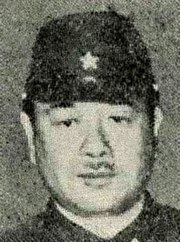| Kiyotake Kawaguchi | |
|---|---|
 Japanese General Kiyotake Kawaguchi Japanese General Kiyotake Kawaguchi | |
| Native name | 川口 清健 |
| Born | (1892-12-03)3 December 1892 Kōchi City, Kōchi Prefecture, Japan |
| Died | 16 May 1961(1961-05-16) (aged 68) |
| Allegiance | |
| Service | |
| Years of service | 1914–1945 |
| Rank | Major General |
| Battles / wars | |
Kiyotake Kawaguchi (川口 清健, Kawaguchi Kiyotake, 3 December 1892 – 16 May 1961) was a general in the Imperial Japanese Army during World War II.
Biography

A native of Kōchi Prefecture, Kiyotake graduated from the 26th class of the Imperial Japanese Army Academy in 1914, and from the 34th class of the Army Staff College in 1922. He spent much of the 1920s and 1930s in a series of staff positions in the North China Area Army and in Japan, before his promotion to major general in 1940.
In 1940, Kawaguchi was appointed commander of the IJA 35th Infantry Brigade. This was under the direct command of the Southern Army and was formed from units from the IJA 18th Division. Kawaguchi's reinforced brigade made a series of landings in British Borneo in December 1941 and January 1942: at Miri, Kuching, Brunei, Jesselton, Beaufort, Labuan Island and Sandakan. During the later stages of the Japanese occupation of the Philippines, it landed at Cebu in March 1942 and Mindanao the following month. As commander of Army forces on Cebu after the invasion of the Philippines in 1942, Kawaguchi objected strenuously to the "revenge killings" of senior Philippine government officials and supreme court justices by Japanese authorities, most notably Japanese Army Colonel Masanobu Tsuji. He argued that, "shooting defeated opponents in cold blood was a violation of the true Bushido." His protests earned him the enmity of Tsuji, who used every opportunity to get Kawaguchi reassigned to combat zones from which he was not likely to return.
Kawaguchi and his 35th Infantry Brigade, along with other attached units, were landed as reinforcements on Guadalcanal in August and September 1942 in response to the Allied landings on the island. In the resulting Battle of Edson's Ridge on 13 September 1942, Kawaguchi's forces were defeated with heavy losses and forced to retreat from the battlefield. Kawaguchi was subsequently relieved of command during the Japanese preparations for another attack in October 1942 and evacuated from the island and back to Japan.
Kawaguchi was relegated to the reserve list in 1943. After recovering from a long illness, he was placed in command of the defenses of Tsushima Island in March 1945.
After the surrender of Japan, Kawaguchi was transferred to the Philippines to face the military tribunal of the Philippine Army for war crimes committed in Lanao province. He pleaded guilty and was sentenced to six years imprisonment on November 14, 1949. On July 4, 1953, President Elpidio Quirino pardoned all the remaining Japanese war criminals under Philippine jurisdiction.
Kawaguchi died in Japan in 1961.
References
- Ammenthorp, The Generals of World War II
- L, Klemen (1999–2000). "Major-General Kiyotake Kawaguchi". Forgotten Campaign: The Dutch East Indies Campaign 1941-1942.
- ^ L, Klemen (1999–2000). "The Invasion of British Borneo in 1942". Forgotten Campaign: The Dutch East Indies Campaign 1941-1942. Archived from the original on 2015-04-01.
- Harries, Soldiers of the Sun, p. 338.
- Frank, Guadalcanal: The Definitive Account of the Landmark Battle
- Chamberlain, Sharon Williams. "Justice and Reconciliation: Postwar Philippine Trials Against Japanese War Criminals in History and Memory". GWU Library. George Washington University. Retrieved 1 May 2023.
Books
- Frank, Richard (1990). Guadalcanal: The Definitive Account of the Landmark Battle. New York: Random House. ISBN 0-394-58875-4.
- Fuller, Richard (1992). Shokan: Hirohito's Samurai. London: Arms and Armour Press. ISBN 1-85409-151-4.
- Harries, Meirion; Susie Harries (1994). Soldiers of the Sun : The Rise and Fall of the Imperial Japanese Army. New York: Random House. ISBN 0-679-75303-6.
- Hayashi, Saburo (1959). Kogun: The Japanese Army in the Pacific War. Marine Corps. Association. ASIN B000ID3YRK.
- Smith, Michael T. (2000). Bloody Ridge: The Battle That Saved Guadalcanal. New York: Pocket. ISBN 0-7434-6321-8.
Web
- Ammenthorp, Steen. "Kawaguchi, Kiyotake". The Generals of World War II.
- Budge, Kent. "Kawaguchi Kiyotake". Pacific War Online Encyclopedia.
- L, Klemen (1999–2000). "Forgotten Campaign: The Dutch East Indies Campaign 1941-1942". Archived from the original on 2011-07-26.
- Hough, Frank O.; Ludwig, Verle E.; Shaw, Henry I. Jr. "Pearl Harbor to Guadalcanal". History of U.S. Marine Corps Operations in World War II. Retrieved 2006-05-16.
- Shaw, Henry I. (1992). "First Offensive: The Marine Campaign For Guadalcanal". Marines in World War II Commemorative Series. Retrieved 2006-07-25.
- Zimmerman, John L. (1949). "The Guadalcanal Campaign". Marines in World War II Historical Monograph. Retrieved 2006-07-04.